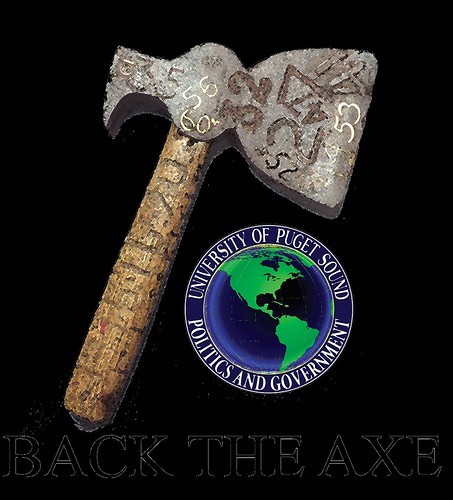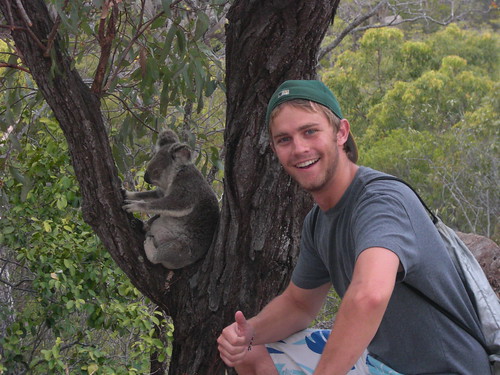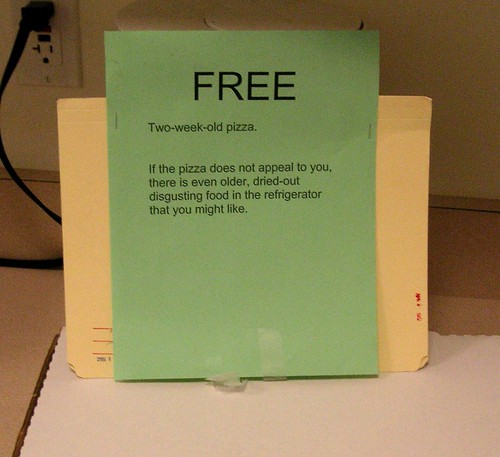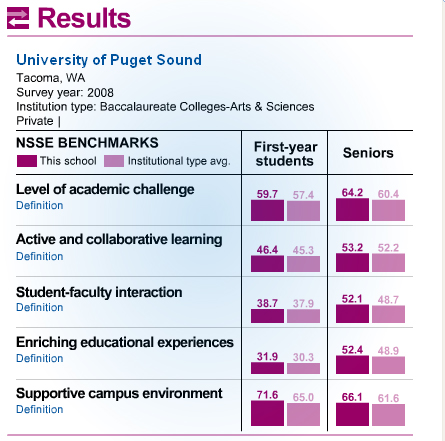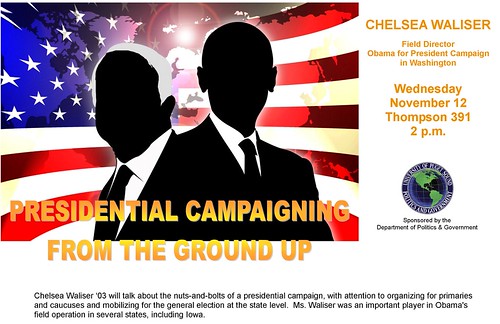Tuesday, November 25, 2008
Remembering Doug Edwards
Monday, November 24, 2008
Back the Axe
Okay, so it's a hatchet, but allow a little creative license. In commemoration of the return of the hatchet, we've got a new design for Politics and Government for 2009, and in a hoodie, no less:
We'll be taking orders on campus next semester and if you're off campus, we already have them in our Cafe Press shop for only $25 bucks. What a deal.
Friday, November 21, 2008
Video Excerpt: Chelsea Waliser talk
You'll forgive the initially shaky video, as I was using a camera without a tripod. Click on the video (not the play button)if you want to watch it in higher quality; there is an option in YouTube on the bottom right of the screen on their site.
Thursday, November 20, 2008
Wednesday, November 19, 2008
US Canada Student Conference
Student Crossing Border Conference & Debate
5-6 March 2009
Seattle, Washington
Canada and the United States share one of the world's longest borders and are each others largest trading partners. Canada is America's largest supplier of crude oil, natural gas and electricity. The U.S. and Canada are allies in the War on Terror and partners in NORAD for decades. However, as in most relationships, challenges and differences do exist.
EVENT / DATES
The Consulate General of Canada Seattle, in collaboration with the Pacific Northwest Canadian Studies Consortium, is organizing a two-day Student Conference to focus on the US-Canada border and issues of importance in the bi-lateral relationship.
After arrival in Seattle on Thursday 5 March, the students will travel to the US-Canada border Port of Entry at Blaine WA / Surrey BC for presentations and tours organized by the Canada Border Services Agency and US Customs and Border Protection. Students will learn about the operations of both agencies and how they partner to secure the border against threats while expediting travel for legitimate trade and commerce. The day will conclude with a Welcome Dinner in Bellingham, Washington and return to Seattle.
On Friday 6 March the Conference will entail 4 panel presentations. Each panel will focus on an issue of importance to Canada and the United States and last 90 minutes. Each panel will have two teams. Each team will be composed of one American and one Canadian student. Each team will be tasked with researching, presenting and explaining the issue assigned (the American student will present the American position and the Canadian student will present the Canadian position). Each team will suggest a resolution / solution. A moderator and members of the audience will be invited to ask questions and / or challenge the presentations and resolutions of two teams. A team of judges will select the team deemed to have made the best presentation and proffering the most convincing resolution / solution. The day will conclude with an Awards Dinner.
STUDENT ELIGIBILITY / SELECTION
A total of 16 students will be selected. Eight American and eight Canadian. Students must be full-time undergraduates attending a university in Washington, Idaho, Oregon, Alaska, British Columbia or Alberta that is a member of the Pacific Northwest Canadian Studies Consortium. No more than two students will be selected from any one university.
Interested students must complete the attached application and mail / fax no later than
15 December 2008. Successful applicants will be notified by 15 January 2009. Students will be paired (one American and one Canadian for each of the 8 teams) and assigned their issue by 1 February. Students are invited to work with their faculty advisors to see if this may qualify as an independent study to earn course credit.
Tuesday, November 18, 2008
President Thomas talks about our economic situation
All of us are living through a period in which we have witnessed dramatic and unprecedented economic events throughout the nation and around the world. These developments have affected—and will affect—our personal lives both directly and indirectly. We have also been hearing and reading daily reports of colleges and universities facing difficult financial decisions as a result of those circumstances. I write to you today to assure you that, although University of Puget Sound is by no means immune to the financial challenges we have seen and will see ahead, we are navigating these challenging times from a position of strength.
We are fortunate that Puget Sound has a long tradition of careful planning, strong operating performance, and balanced budgets. It is an advantage to enter a tough economic environment like this one with such a record, along with a clear commitment to a shared mission. As always, and with increased intensity, we will continue to make thoughtful decisions about our endowment, debt portfolio, operating expenses, fundraising, financial aid, tuition prices, and budget planning. Unlike many institutions, we have no plans to initiate mid-year changes to our budget—including, and especially, to tuition and financial aid. We plan to stand by our commitments to students and families, and to our entire community.
Puget Sound has strong liquidity to cover operating expenses, and has had uninterrupted access to cash throughout the economic crisis. Puget Sound’s operating cash is largely invested in an AAA-rated money market fund, currently benefiting from the U.S. Treasury’s Temporary Guarantee Program. Due to falling short-term interest rates on high quality investments, earnings on that cash have declined dramatically, however, diminishing one important source of revenue within our operating budget. Should credit be needed, Puget Sound maintains strong long-term credit ratings of A1 and A+ from Moody’s Investors Services and Standard & Poor’s, respectively.
Also in recent months, Puget Sound’s endowment market value has declined because a portion of our portfolio is exposed to public stock markets that have declined significantly. Declines have been less than the U.S. and international stock market indices because the endowment has been broadly diversified and invested with the long-term in mind, including anticipation of bear markets. Endowment distributions are calculated using a 36-month average to smooth budget impacts from volatile markets. Smoothing distributions is important because annual endowment distributions support student financial aid, academic programs, and general operations. Endowment distributions were up 10.4 percent in 2007-08. We know that future distributions will be negatively impacted in the next few years, although we can’t yet know the precise degree.
Looking ahead to next year, Puget Sound’s Budget Task Force has convened several times this fall and is in the midst of preparing a recommendation to me for the 2009-10 budget. This budget will be finalized, after review by the board of trustees, in late February 2009. As is our custom, this information will be shared broadly as soon as it is available.
We are making a special effort to enroll a qualified and diverse freshman class for next year and to retain our current students as well. Anticipating a high demand on financial aid in these challenging times, we remain committed to supporting families and students financially as they make an investment in a Puget Sound education. To ease the pressure on tuition increases, we will also continue our vigorous fundraising efforts, which have seen great success in recent years and will be of increasing importance as we see other revenue streams attenuated.
We will no doubt have difficult decisions to make as we plan for the future. I will ask the entire community to be thoughtful in assessing needs and priorities, and creative in designing solutions. Puget Sound has long been a place that has successfully accomplished more with less, efficiently and effectively deploying resources where they are needed most. Our budget managers are conscientious, innovative and resourceful, with student success and the university’s long-term health always in mind. Working together, we will continue to serve our mission effectively, achieve our strategic goals, and ensure our financial health.
It is important to note that these times underscore the value of our efforts even as they bring into sharp relief the challenges before us. This year we celebrate Puget Sound’s 120th anniversary, and over the course of more than a century we have always emerged out of challenging times stronger and with more clarity about our purpose and mission.
Now is a time to think strategically and for the long term, to act with confidence as we address unprecedented economic conditions. It is a time to keep first things first. Our purpose is to prepare students for the highest tests of democratic citizenship in an often uncertain world. That mission, as the distinctive and distinguished national liberal arts college Puget Sound has become, has never been more clear, and at no time in our history has it been more urgent or the need for it more great.
Sincerely,
- Ron
~ ~ ~ ~ ~ ~ ~ ~ ~ ~ ~ ~ ~ ~ ~ ~ ~ ~ ~
Ronald R. Thomas, President
University of Puget Sound
1500 N. Warner St. #1094
Tacoma, WA 98416-1094
Tel: 253-879-3202
Fax: 253-879-3938
Monday, November 17, 2008
Friday, November 14, 2008
Student conference on human rights
--
Shalyn Hockey, Sarah Malin, Hallie Ryan
Directors
Northwestern University Conference on Human Rights
conferenceonhumanrights@u.
Professor Share's band: a review
BLUEGRASS FROM COFFEETOWN
By Doug Bright
All too often, especially in this age of relentless musical homogenization, urban bluegrass bands tend to be painfully easy to identify. Despite their polished vocal harmonies and slick instrumental chops, the twangy, heartfelt simplicity that defined the music in the early 1950's is virtually absent. Nevertheless, one all-star bluegrass band from Latt`e Land stands in refreshingly sharp contrast, demonstrating a high standard of musicianship without losing the music's deep-rooted hillbilly soul. In witty recognition of this fact, the band calls itself The Downtown Mountain Boys.
The seeds were planted about 1999 when fiddler Paul Elliott joined a Seattle bluegrass band called Rainy Pass and met singer/guitarist Don Share. A classically trained violinist from childhood, Elliott got his first taste of bluegrass at age 14 when a friend loaned him two historic albums: Flatt and Scruggs' 1962 Carnegie Hall concert and The Nitty Gritty Dirt Band's 1972 all-star country session, WILL THE CIRCLE BE UNBROKEN. "The one-two punch of those was really somethin'!" he recalls. "I thought, You mean you can do that with a violin? Why didn't anybody tell me?"
After studying country fiddle with the now-famous Barbara Lamb, whose father had been his elementary-school music teacher, Elliott joined his first local bluegrass group, The Apple Blossom String Band, about the time of his senior year in high school. During the late 1970's he gained valuable experience touring the Northwest with an eclectically styled trio called The Cats 'n' The Fiddle. "We'd do everything from R&B to traditional fiddle tunes to wacked-out arrangements of old jazz tunes," he recalls. "I learned a lot about arranging and different repertoires. That was a great band!"
After subbing occasionally in California for fiddler Paul Shelasky in the progressive bluegrass band Good Ol' Persons, Elliott spent four more years during the mid-to-late 1980's in a Spokane-based country-rock band. "I don't think that band ever played in Seattle," he says, "but it played Montana, Idaho, Wyoming, and Oregon. That was another pretty hard-workin' band. It's not a very healthy lifestyle. I decided I was gonna go back to the University, which I had dropped out of to go play with The Cats 'n' The Fiddle, and I was gonna do something practical."
Although his early coursework at the University of Washington focused on the hard sciences, Elliott ended up with a degree in music composition. "After I graduated," he recalls, "I went off to London for six months to study composition with a guy over there. I traveled around, came back, and wound up working for Microsoft--a complete left turn. I came out there as a summer job while I was goin' to school at the U. I didn't have any background in it, but I sort of had a knack: I really enjoyed that kind of problem-solving, and I wound up bein' out there for nine years."
It was at the Puget Sound Guitar Workshop around 1999 that Paul Elliott reconnected with bluegrass music. "I sat down in a bluegrass jam session and just totally got my butt kicked," he confides. "It suddenly dawned on me that I really never did know how to play bluegrass, so I went home and looked around to see who was playing bluegrass, and I met Rainy Pass. They were lookin' for a fiddle player, so I started playin' with those guys, and that was really the first time I seriously started investigating bluegrass fiddle as a style and tryin' to work on it. When I started playin' with Rainy Pass, I really got interested in what makes bluegrass bluegrass."
"Rainy Pass really got together around the original songwriting of Nancy Riccio," explains Don Share, who was playing Dobro steel guitar in the group. "She is a really good songwriter. That band was very much her band." About two years after the 2001 release of a critically acclaimed CD called COLD RAINS OF WINTER, Rainy Pass dissolved when Riccio moved to Arizona. It was then that Paul Elliott and Don Share began discussing the formation of a new band. The veteran players under greatest consideration were banjoist Dave Keenan and mandolinist Tom Moran. Keenan, an eclectically styled multi-instrumentalist, had gained his fame in two bands with singer/guitarist Jo Miller: Ranch Romance in the early Nineties and the rockabilly-oriented
Burly Roughnecks a decade later. Moran had played everything from bluegrass to European classical music around town since the 1970's and had, in fact, participated in the progressive jazz string band Cat Walk with Elliott in the early Nineties. "When Rainy Pass broke up," Elliott explains, "I think Don and I were thinking, "Well, gee, what would it be like to be in a band with Tom? What would it be like to be in a band with Dave?" So we asked everybody, and everybody said yes."
The Downtown Mountain Boys' first bassist was Joe Wilmhoff, who had done the digital mastering for the Rainy Pass album. When Wilmhoff returned to college two years later to pursue a career in nursing, he was replaced by Terry Enyeart, a Longview native who had made his first mark on the Seattle bluegrass scene in the popular band Rural Delivery. "When I joined RD," he explains, "I started playin' rhythm guitar and mandolin, so my bass fell to the wayside. We still play: we usually get four gigs a summer."
Of the Downtown Mountain Boys, Enyeart says, "I really enjoy playin' with those guys. It's a great place for me to keep my bass licks up. I play guitar and vocals with the Cascade Mountain Boys, so I guess I'm spreadin' myself a little thin right now, but none of the bands are playing so much that they bump into each other." Despite Enyeart's busy musical life, the Downtown Mountain Boys couldn't be happier. "I've always been a big fan of Terry's," says Dave Keenan.
"Having Terry in the band is great," Paul Elliott concurs. "Terry has always been one of my favorite singers around this area."
In 2006 the Downtown Mountain Boys began crafting their debut CD, working in the do-it-yourself tradition of mountain homebrewing. "Paul recorded it," Dave Keenan explains. "About two years ago Paul decided he wanted to build a studio in his house. He's one of those guys that gets an idea and just goes full boar, so he researched it all, bought a bunch of great mikes, got ProTools, and learned how to do it. It's pretty simple--just two rooms, really, although there's kind of a hallway that's somehow used as well."
Elliott's inspiration had come from working with David Lange, the most popular and respected engineer in the Seattle area folk community. In fact, it was at Lange's studio and under his tutelage that Elliott produced a debut CD for another local bluegrass band, Back Burner. "I had worked a lot in Dave's studio as a musician on other people's projects," he explains. "I hold him in
incredibly high regard as an engineer, especially for acoustic music. He just knows how to get good sound, so it was really cool to have an opportunity to go through the whole process in the studio with Dave as I was working with Back Burner and observe everything he did."
Concerning his own home-based facility, Elliott says, "Studio is maybe a flattering description of it. We don't really have enough room here to record everyone at the same time." Consequently, given the conflicting schedules of the musicians, the size of Elliott's studio, and the impossibility of their fiddler functioning simultaneously as engineer, the Downtown Mountain Boys were forced into a cut-and-paste approach to recording that can be very difficult in a medium as
spontaneous and interactive as bluegrass music. "We just went in, one at a time, and just slowly built this record from the ground up," Dave Keenan remembers. "We did a lot of rhythm guitar first and slowly added little pieces at a time, which is the way that I like to record. I can't explain why, but it worked."
In all too many cases, the cut-and-paste approach results in a performance that's all precision and no soul, but this disc fairly crackles with energy from beginning to end. BIG DARLIN', named for a Paul Elliott instrumental that serves as the final track, offers a satisfying mix of the old and the new delivered with a brand of creativity that's deeply rooted in tradition.
It opens with Nancy Riccio's "Back In The Black", a fast-paced attention-grabber that captures the desperation of living from paycheck to paycheck in tough economic times. Another uptempo Riccio number on this album involves desperation of a different kind, but in this drama the name of the lady being desperately sought is Carol Ann, not Susan. Both are characterized by solid three-part harmony and crisp, snappily choreographed solos from banjoist Dave Keenan, mandolinist Tom Moran, and fiddler Paul Elliott. From the Gibson Brothers, a popular bluegrass band from upstate New York, comes "I Gotta Get Back To You", which features guitarist Don Share in a tight vocal duet with Keenan. The twin fiddle-mandolin work from Elliott and Moran,
sometimes in unison and sometimes harmonized, adds a fascinating dimension. Historically speaking, the oldest number on this album is the traditional "Black-eyed Susie", but here again, the Downtown Mountain Boys put their creativity to use. Instead of the barn-burning tempo at which it's generally performed, their pace is a relaxed lope, with Terry Enyeart leading on the
verses and Moran harmonizing beautifully with Elliott's fiddle. Likewise, Johnny Cash's "Train of Love" is taken at a slower-than-usual tempo, but the band's insistently rhythmic, Cajunesque approach still captures the song's essential train effect.
As this album eloquently demonstrates, the most astonishing thing about the Downtown Mountain Boys is the deeply rooted traditionalism of their original material. Terry Enyeart's "My Holy Beacon" is the quintessential bluegrass gospel song, sounding as if it could just as easily have been written during the music's'formative years. Dave Keenan's "Bug Tussle" has the bluesy, down-home feel of an old-time fiddle-and-banjo tune, but its brisk tempo and heads-up instrumental work would render it exciting in any age. Though somewhat crookedly metered and quirkily chorded, Paul Elliott's "Big Darlin'" possesses a similarly bluesy old-time quality, and the band comes up with fascinating instrumental duet passages that climax with yet another dazzling demonstration of fiddle-mandolin harmony from Elliott and Moran.
Whether they're performing a Flatt and Scruggs classic like "Till The End of The World Rolls Round", a swinging vintage honky-tonker like "Smooth Sailin", or a hot new original, the Downtown Mountain Boys are a true-blue bluegrass band. Their snappy, tradition-based instrumental work is fully matched by solid, country-flavored vocals from Terry Enyeart, Don Share, and Dave Keenan. "Basically, we've got three baritones," Paul Elliott confides. "We don't really have a tenor singer, so every time we're workin' up a song, there's a lot of experimentation to find out how we can stack stuff and what key to look for. It's a limitation, but I guess it defines."
With the exception of bluegrass festivals and local performances, the Downtown Mountain Boys are relying on the popular online music store Cdbaby.com to sell their album, and they're delighted with the results. "I can't think of a bad thing to say about 'em," Paul Elliott says of the Portland-based company. "Heck, it's brought us sales from Spain and Brussels and Italy! We're not talkin' hundreds of sales, but every once in a while you get a piece of mail saying, "Hey, guess who bought your CD!" It's amazing! The Internet is not only the world's largest book; it's the world's largest store. There's never been a parallel."
The band's Internet presence is greatly enhanced on a local level by its website, www.downtownmountainboys.com. Designed and maintained by Don Share, it offers a performance calendar, sound samples from the BIG DARLIN' album, and a link to the Cdbaby page where customers can buy it. "I've become the webmaster," Share says modestly. "I'm sort of self-taught."
The Downtown Mountain Boys appear November 28th at Crossroads Mall in Bellevue and November 29th at Phinney Neighborhood Center, 6532 Phinney Avenue North, for a 7:30 Seattle Folklore Society Concert.
Thursday, November 13, 2008
How engaged are we?
These numbers are encouraging--we are above the average across the board. Find out more, and look at other institutions, here.
Wednesday, November 12, 2008
Tim Bradshaw '84 elected to King County Superior Court
http://www.bradshawforjudge.org/
President Thomas on the presidential election
The Best of Times in the Worst of Times
By RONALD R. THOMAS
It was like the closing scene of the most melodramatic Dickens novel, in which some noble and generous sentiment finally, miraculously, triumphs over the dark forces of suspicion, greed, and deceit, bringing together a fractured family and a frayed community in a celebration of hope and possibility.
Last week, on election night, after the most-historic presidential victory was declared, I tore myself away from the television set where I had been anxiously watching the returns with my wife and wandered over to the University of Puget Sound student union to see if the students were savoring the significance of the moment. As I walked briskly through the campus (I didn't want to miss anything), I heard shrieks of victory and joy echoing everywhere, coming from groups of young voices throughout the campus. All around me, I began to see crowds of students spontaneously streaming together, bound for the same place in the center of campus — the omphalos of our student union.
They had been scattered around in their residence-hall rooms and lounges watching the returns, too, and now needed to assemble to mark the moment. As I arrived at the union, I found young people spontaneously cheering, shouting, dancing. They collected in the large entry of the building, a couple hundred of them, cheering and hugging, hoisting their cellphones aloft and taking pictures. They were chanting, "Yes we can!" and "O-Ba-Ma!" in unison, with a conviction far greater than their enthusiastic cheers at our recent football games. Some were banging pots and pans, others holding election signs, others embracing.
Then, suddenly, spontaneously, they all joined hands and burst out singing, at the top of their lungs, "The Star-Spangled Banner." "The Star-Spangled Banner"! They knew. They knew. This was their moment. This was their election.
Across the room, I saw the face of our student-government president, who also happens to be the first African-American student president in our university's history. As I approached him and our eyes met, words failed, and we engaged in the old "power to the people" handshake from my college days. "Remember this night," was all I could say. "Remember this."
We glanced up at the television screen and caught a view of the cheering crowds in Chicago's Grant Park, awaiting the victor's appearance. I flashed back to a scene, as if it were yesterday, that had taken place 40 years earlier in 1968, when, as a college freshman, I joined thousands of others in that same Grant Park to march in support of peace and civil rights. That was the year of my first involvement in a presidential election, and I, too, had great expectations.
I remembered watching, a few months later, images of the 1968 Democratic National Convention on television, and scenes of bloodshed and billy clubs, police and their dogs in combat with students, right there in Grant Park. And I recalled joining another huge crowd in Grant Park a year later, for a free concert by Grace Slick and Jefferson Airplane commemorating the student protesters at the 68 convention. The music railed against the Vietnam War and prophesied a new day. Finally, I flashed on another occasion, when we assembled in Grant Park in 1970, this time to mourn and protest the deaths of four students from Kent State University who had been killed by the Ohio National Guard — students not unlike those all around me now, who were dancing and smiling and singing the national anthem.
In that same park on this night, the crowd gathered to laugh and weep, to celebrate and usher in a new age. Crowds gathered in Times Square, too. And in Jakarta. In London, Paris, and Cape Town, in Kenya and Japan. Something important had happened, and everyone knew it. The students around me in the student union in Tacoma, Wash., also understood that they had made it happen, along with so many others, in an unprecedented surge of youth voting, civic involvement, and a belief that their actions could make a difference. Yes, they did.
In so many ways, we can define these days as the worst of times. But on election night, it seemed like these just might become the best of times, too. This was a night when many of us, like orphans in a Dickens novel, found our way home again, full of hope and great expectations.
Ronald R. Thomas is president of the University of Puget Sound, a member of the board of the American Council on Education, and a scholar of Victorian literature and culture.
Tuesday, November 11, 2008
World Affairs Council Internship, Seattle
The World Affairs Council in Seattle has quarterly unpaid internships for up to 12 internationally-minded students in the Puget Sound Community. We have six departments which include Administration, Development, Membership, International Visitor Program, Community Program, and Global Classroom. If you are interested in applying, please visit the website at www.world-affairs.org/aboutus_internships.html and take a closer look each department.
The application deadline for the winter quarter internship program is Friday, November 21, 2008. You may submit your resume and cover letter to Ms. Jodi Kohlmeyer at jkohlmeyer@world-affairs.org.
Please pass on this information to your students or advisees who may be interested in our internship opportunity.
If you have any questions, please contact Ms. Jodi Kohlmeyer, at jkohlmeyer@world-affairs.org.
We look forward to your application.
Autumn Lerner
Director, International Visitor Program
Chief Operating Officer
World Affairs Council
2200 Alaskan Way, Suite 450
Seattle, WA 98121
(ph) 206.441.5910
(fax) 206.441.5908
(cell) 206.234.1156
alerner@world-affairs.org
www.world-affairs.org
The President's Flickr
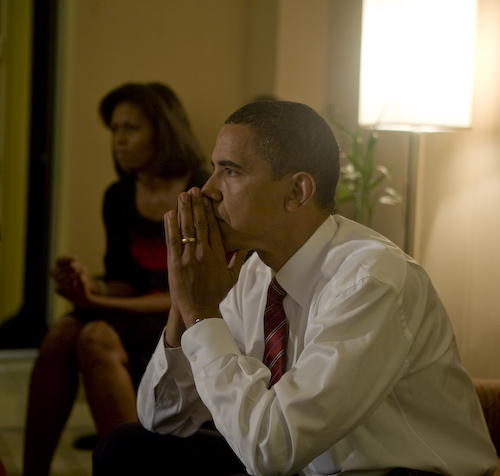
I didn't know that the Obama folks was using Flickr to upload pictures from across their campaign. They've also got shots, like this one, from Obama's hotel room on election night. This picture is taken as he watches McCain's concession speech. See all the pictures here (hat tip: Carly Kneppers '05
Monday, November 10, 2008
The president's Cab
Discover Cab Calloway!
Friday, November 07, 2008
Chelsea Waliser '04 talk on the Obama Campaign
Geoff LeGrand '10: Reflections on a summer in DC
For many students in the Politics and Government department, an internship in a congressman's D.C. office seems the ideal summer internship. This past summer, I had the honor of interning for Congressman Adam Smith (D-WA) in his Washington, D.C. office. However, having gone through this experience, I would like to take an opportunity to analyze the elements that, in reflection, I feel other students should consider before accepting their own internships.
One of the biggest challenges of hunting for internships often seems to be uncovering exactly what they entail. Often, internship duties are discussed in vague language. When considering a Capitol internship, these duties vary widely by office. However, they generally consist of data input – taking constituents concerns or comments via email, phone, fax, or mail and putting them into a computer database. This is generally the central duty of most Capitol interns. Other than that, the second most common duty is usually giving tours of the Capitol complex to constituents. Otherwise, interns essentially act as receptionists – taking care of whatever menial office duties are required.
With that said, I feel there are a number of misconceptions surrounding life as a Capitol intern. First, it must be emphasized that being a Capitol intern has little, if anything, to do with that which we learn here as students. Rarely does knowing the difference between open and closed list proportional representation electoral systems prove useful in one's life as an intern. Rather, being a Capitol intern is more similar to being a politician than a student of politics. The skills required are generally not taught in schools – the ability to write effective memos or carry a political motif. Most troublesome may be the ability to write without expressing the slightest bias on a given issue – the antithesis of what most Politics and Government students are taught to do. Most students will have to learn some or all of the requisite skills on the job. This transition from the ivory tower can be a stressful experience as many academic norms are ill suited to the Capitol environment.
The other common misconception is that being a Capitol intern is somehow a glamorous job. It is not. Interns are a dime-a-dozen in the Capitol. This is not to say that interns are disrespected – in fact there are strong norms against disrespecting interns. However, it is almost important to accept a Capitol internship with a clear sense of modesty. In academic life, future Capitol interns receive a lot of respect for having received a widely sought and prestigious internship. In D.C., however, interns unsurprisingly sit towards the bottom of the Capitol hierarchy. Their day-to-day role in the office will reflect this.
With that said, there are certainly numerous wonderful aspects of D.C. internship. The opportunities for networking are unlimited and many Capitol interns use their experience as a launching pad for their later careers. Furthermore, the educational experiences are also wonderful – both on and off the hill there are frequent intern-oriented lectures or briefings hosted by D.C. elites in their respective fields. Finally, the social aspects of a D.C. internship are wildly fun. Because so many interns from so many different places descend on D.C. during the summer – there is lots of friendship to be made, and lots of social events offered to interns. These range from a massive network of intramurals sports leagues (kick-ball, bocce ball and flip-cup leagues were some of many when I was in the city) to citywide scavenger hunts to other more traditional events.
The purpose of this reflection is certainly not to discourage anyone from accepting a Capitol internship. As I have said, it looks wonderful on a résumé, and can offer a wide variety of amazing experiences. In many cases you may never know where you want to take your career until you try out a variety of different options. Even if you do not like your Capitol internship, you will probably still walk away with a better idea of what you want to do in the future, and having had a lot of fun along the way.
With that said though, it's important to remember that Capitol internships are not the only game in town. There is a whole assortment of different internships available to Politics and Government students and many of these are of equal or higher caliber to a Capitol internship. A Capitol internship is not necessarily for everyone. If you are not oriented towards working in domestic politics or are looking for a laid back summer internship – this may not be the right experience for you. Choosing a Capitol internship because it seems the most glamorous is unwise. Rather, I would suggest one take the 'glamour' factor out of the equation and assess internships based on their own career desires and how they wish to spend their summers. This may still lead you back to the Capitol, but at least you will be there for the right reasons.
Thursday, November 06, 2008
We are up and coming
http://colleges.usnews.rankingsandreviews.com/college/libarts-uc-rank
This is clearly due to our department.
Wednesday, November 05, 2008
International reaction to the election
http://news.bbc.co.uk/2/hi/in_depth/7710631.stm
How poltiical scientists view the election results
The country just elected its first African-American president, a historic event capping a nearly two-year campaign of shattered fund-raising records, massive voter turnout and unprecedented participation in politics. Academics may be savoring the moment, but political scientists, at least, are more interested in how very ordinary it was...
As it turns out, some of the models political scientists have been using for years to predict the outcomes of national elections — taking into account factors like the popularity of the incumbent, party identification and economic indicators — weren’t tossed aside along with the many other fragments of conventional wisdom that were upended during the campaign. In fact, they were validated.
Read more here.
Tuesday, November 04, 2008
Maybe we're liberal, but students ignore us anyway.
An article of faith among conservative critics of American universities has been that liberal professors politically indoctrinate their students. This conviction not only fueled the culture wars but has also led state lawmakers to consider requiring colleges to submit reports to the government detailing their progress in ensuring “intellectual diversity,” prompted universities to establish faculty positions devoted to conservatism and spurred the creation of a network of volunteer watchdogs to monitor “political correctness” on campuses...
But a handful of new studies have found such worries to be overwrought. Three sets of researchers recently concluded that professors have virtually no impact on the political views and ideology of their students.
If there has been a conspiracy among liberal faculty members to influence students, “they’ve done a pretty bad job,” said A. Lee Fritschler, a professor of public policy at George Mason University and an author of the new book “Closed Minds? Politics and Ideology in American Universities” (Brookings Institution Press).
Read more here.
Monday, November 03, 2008
PAID internship--
Greetings;
The Washington Restaurant Association is looking for an intern for the legislative session. I posted the internship information on the school’s web site, but wanted to ensure your students were all aware of the open position.
I attached the general information about the position, and more information about the WRA can be found on our web site: www.wrahome.com.
The internship is paid, and we are able to work around any schedule students may have. We ask that any applicant have good-excellent writing skills, have a senior standing in school, and be available for full or part time work in Olympia during Jan. - March/April.
Thank you; feel free to contact me with any questions about the internship.
Julia Clark
Government Affairs Assistant
Washington Restaurant Association
www.wrahome.com
510 Plum St. SE, Ste. 200
Olympia, WA 98501
Work: 800.225.7166 x109
Cell: 360.628.7299
Fax: 360.357.9232
julia@wrahome.com
The Washington Restaurant Association, in its 79th year, is the leading business association for the restaurant industry — the largest private employer in the state with a workforce of more than 193,000 employees. In Washington, the more than 12,500 restaurants annually generate $10.7 billion to the state economy and contribute $593 million in state taxes. Washington restaurants are vital to our economy, community and careers.
Professors Sousa and Haltom predict the election
Election day scenarios
A note on the popular vote:
If Obama wins with over 50.1 percent of the national vote, he will be the third Democratic presidential candidate in 100 years to do so. FDR did it 4 times, with a maximum of 60.8% (1936) and a minimum of 53.4% (1944). Johnson ran at 61.1% in 1964. Carter got just 50.1%, and Wilson (twice), Truman, Kennedy, and Clinton (twice) were elected with less than 50% of the popular vote. Gore beat Bush in the popular vote but did not win 50% of the national popular vote.
It appears likely that Obama will win with 52 or 53 percent of the popular vote, which seems close but in historical perspective is a strong performance for a Democrat. This would be the second time a Democrat has done this well since before the end of WWII! Interestingly, many of the political scientists who predict election returns projected Obama wins with 52 or 53% months ago, raising once again the question of whether campaigns matter.
The electoral college:
These scenarios get a little confusing without a scorecard.
Most optimistic McCain map: McCain 281 Obama 257.
McCain has focused heavily on Pennsylvania as a matter of necessity. Because he has lost several Bush states—IA, NV, CO, NM—Pennsylvania is vital, but it’s not enough. Even if he wins Pennsylvania and Ohio (it’s hard to imagine him winning PA while losing OH) and holds the currently competitive Bush states like Indiana, Missouri, Florida, and North Carolina, Obama would still win the with the narrowest margin—270 electoral votes.
So, the most optimistic McCain scenario requires him to take Virginia in order to win.
This gets McCain to 281 electoral votes.
So in this scenario Obama wins all the Kerry states except PA, plus IA, NV, NM, and CO. McCain holds all of the Bush states but those listed above, and wins the election by cracking PA.
I think that this scenario is unlikely, but the most likely McCain victory map. I also think that Obama is going to outperform Kerry and Gore in lots of “red” states, and that under this scenario there’s a good chance that Obama wins a fairly solid popular vote victory while losing the electoral college.
I don’t think that there’s another feasible McCain victory map. Therefore, while watching the election returns on Tuesday the first focus should be on PA and VA, while keeping in mind that Obama wins in FL or NC mean that Obama will be elected in a fairly broad electoral college sweep. Sousa’s recommendation is that if you are at an election night party, eat dessert first, because the party could well end early!
Least optimistic Obama map. Obama 270, McCain 268. Under this scenario, Obama wins the election by carrying the Bush states listed above (IA, NM, NV, CO) and trading Kerry state PA for Bush state VA. It’s still hard for me to imagine a Democrat losing PA while carrying VA, so there’s a second version of this scenario in which Obama holds PA and loses VA: Obama 278, McCain 260. Given current polling, I think that it’s far more likely that Obama will carry both PA and VA and win with 291 electoral votes.
In fact, I think it’s highly unlikely that Obama will lose Pennsylvania. Thus, my recommendation that you eat dessert first at your election party holds.
All of the other feasible electoral college maps show Obama wins. The only questions are whether he will carry southern states—GA, NC, or FL—and crack OH and, more significantly, Indiana and Missouri. If a black Democrat from Illinois runs strong
Sousa’s presidential prediction? Obama 311, carrying Bush states Virginia, Ohio, NV, NM, CO, and IA and holding all of the Kerry states. Florida might get him to 338, but with polls so close there and the demographics of that state I see McCain as slightly advantaged here. I don’t think that Obama’s strength in NC, GA, IL, and MO and other “red states” like Montana are mirages. In fact, I think that given the trends in those states and the likely bloodletting in the Republican party after this (likely) McCain defeat, a reasonably successful Obama first term would redraw the electoral map of American politics substantially, solidifying Obama’s strategy of “expanding” Democratic efforts to formerly red states. Looking ahead, Obama’s got to hope that the economy turns around by 2010-2011 and that he gets the kind of lift that Reagan did from the recovery after the depths of the 1982 recession.
And from Professor Haltom:
David's report is measured and cogent.
I utterly agree that VA is crucial. For at least 22 days, VA has leaned
Obama's way. His lead in VA is > 5%. Most important, most recent polls
show Obama above 50% -- even if all undecideds go to McCain-Palin, Obama
squeaks through [ignoring the margin of error due to outlandish
hypothetical].
VA is scheduled to close its polls at 7:00 p.m. EST, so it MAY be a
temporally leading indicator. [If polling places are overwhelmed,
however, polls may close at 7:00 p.m. but everyone "in" the polling area
may be allowed to vote -- I am unsure.] If exit polls indicate an Obama
victory in VA, that deprives McCain-Palin of 13 electoral votes and puts
them, even with the most pro-GOP assumptions, under 270. Before PA
closes [supposedly at 8:00 p.m. EST], VA may render PA's electoral votes
moot. Then all that McCain-Palin would have would be some Diebold
miracle.
Indiana and Kentucky are scheduled to close their polls at 6:00 p.m.
EST. If Indiana actually goes Obama -- as David notes, not impossible
but not likely -- that may be the earliest signal that the Obama ground
game was what it was cracked up to be. Election-watchers should then
steel themselves for other Obama "takeaways."
P&G should probably counsel election-watchers to monitor the Dole-Hagan
Senate race when NC polls close at 8:30 p.m. EST [presumably]. That MAY
keep guests from desserting and deserting.

